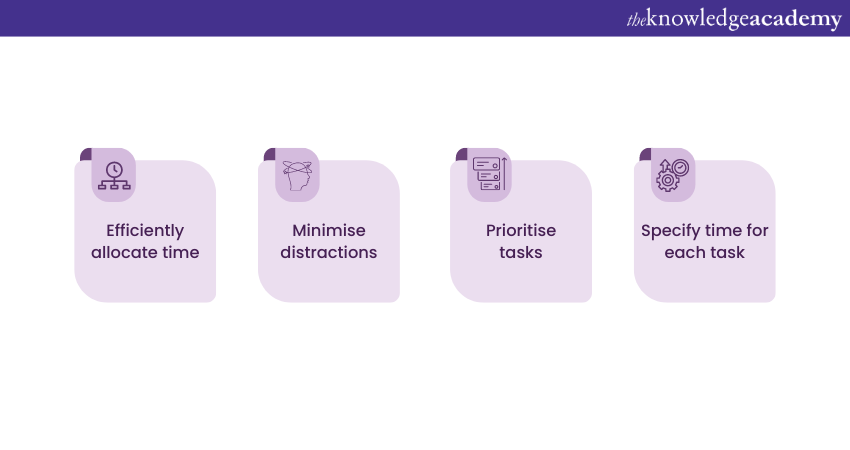We may not have the course you’re looking for. If you enquire or give us a call on +420 210012971 and speak to our training experts, we may still be able to help with your training requirements.
Training Outcomes Within Your Budget!
We ensure quality, budget-alignment, and timely delivery by our expert instructors.

Time Management is a fundamental skill that plays a pivotal role in both our personal and professional lives. It involves the efficient and effective allocation of our limited time to various tasks and activities. In today's fast-paced world, where demands and responsibilities are ever-increasing, mastering and utilising the Benefits of Time Management is crucial for success.
Further, read this blog to get a comprehensive overview of the top Benefits of Time Management. By understanding and implementing effective Time Management techniques, individuals can experience increased productivity, reduced stress levels, and improved work-life balance. Additionally, it helps enhance focus and concentration and provides increased opportunities for growth. Let's delve into each of these benefits to unlock the secrets of managing time wisely.
Table of Contents
1) Increased productivity
2) Reduced stress levels
3) Improved work-life balance
4) Enhanced focus and concentration
5) Increased opportunities for growth
6) Conclusion
Increased productivity
One of the primary Benefits of Time Management is the significant increase in productivity that individuals can experience. When you manage your time effectively, you gain the ability to prioritise tasks and allocate your time wisely, leading to a higher level of efficiency in your work.
Effective Time Management allows you to identify and focus on high-priority tasks, ensuring that you tackle the most important responsibilities first. By doing so, you can maximise your productivity and accomplish more in less time. This sense of accomplishment not only boosts your confidence but will also motivate you to continue being productive.
Moreover, Time Management helps avoid procrastination, a common enemy of productivity. By setting clear deadlines and breaking down tasks into manageable chunks, you can overcome the temptation to delay tasks until the last minute. This proactive approach will allow you to complete tasks well ahead of time, reducing stress and improving the quality of your work.
Another aspect of Time Management that enhances productivity is the ability to create a schedule or routine. By structuring your day and allocating specific time blocks for different activities, you can eliminate ambiguity and minimise wasted time. This structured approach will enable you to maintain focus and avoid getting sidetracked by distractions.
Furthermore, effective Time Management will encourage you to make efficient use of technology and productivity tools. With the abundance of digital calendars, task management apps, and project management software available, you can leverage these tools to streamline workflow and ensure that you stay organised.
By practising Time Management techniques consistently, individuals can experience a substantial boost in their productivity levels. Whether it's completing tasks faster, accomplishing more in a day, or achieving long-term goals, the benefits of increased productivity have a profound impact on personal and professional growth.
Boost productivity and conquer your schedule. Register in our Time Management Training now!
Reduced stress levels
In addition to enhancing productivity, effective Time Management can significantly reduce stress levels. When you manage your time well, you will experience a sense of control and balance in your life, which directly translates into lower stress levels.
One of the primary causes of stress is feeling overwhelmed by the sheer number of tasks and responsibilities we need to handle. However, by implementing Time Management techniques, you can break down large projects into smaller, more manageable tasks. This approach not only makes the workload seem more achievable but also reduces the stress associated with tackling overwhelming projects.
Procrastination is another major source of stress. When we continuously put off tasks until the last minute, we find ourselves scrambling to complete them, leading to heightened stress levels. Time Management helps us avoid this by encouraging us to prioritise tasks and allocate sufficient time to complete them. By spreading out the workload and working steadily towards deadlines, you can eliminate the anxiety and pressure that come with last-minute rushes.
Having a clear and well-organised schedule is also instrumental in reducing stress. When we know what needs to be done and when we can approach our daily activities with a sense of purpose and direction. This clarity eliminates the stress associated with uncertainty and helps us stay focused on our priorities.
Furthermore, effective Time Management allows us to create space for self-care and relaxation. By allocating time for activities that rejuvenate us, such as exercise, hobbies, or spending time with loved ones, we can recharge ourselves and manage stress more effectively. Balancing work and personal life through Time Management ensures that we do not neglect our well-being, leading to a more harmonious and stress-free lifestyle.
In summary, Time Management serves as a powerful stress management tool. By breaking down tasks, avoiding procrastination, maintaining a well-organised schedule, and prioritising self-care, individuals can significantly reduce stress levels and experience a greater sense of calm and balance in their lives.
Improved work-life balance
Another Benefit of Time Management includes improved work-life balance. Achieving a healthy work-life balance is a common aspiration for many individuals, and effective Time Management is instrumental in making it a reality. By managing your time wisely, you can create boundaries and allocate sufficient time for both professional commitments and personal activities, leading to a more fulfilling and balanced life.
Time Management allows you to prioritise personal activities and allocate dedicated time for hobbies, interests, and spending quality time with loved ones. By consciously making time for these aspects of your lives, you can prevent work from taking over and ensure that you maintain a sense of fulfilment and happiness outside of your professional responsibilities.
Setting clear boundaries between work and personal life is another crucial aspect of Time Management. When we establish specific time frames for work-related tasks and designate periods for rest and leisure, we can prevent work from encroaching on our personal time. This separation is essential for maintaining mental and emotional well-being, as it allows us to recharge and engage in activities that bring us joy and fulfilment.
Moreover, effective Time Management enables us to avoid burnout. By allocating breaks and moments of relaxation throughout our day, we can prevent excessive stress and exhaustion. Taking regular breaks and allowing ourselves time to rest and rejuvenate improves our overall productivity and performance, ensuring that we can sustain a healthy work-life balance in the long run.
Another benefit of improved work-life balance through Time Management is the positive impact it has on our relationships. When we allocate quality time for our loved ones, we strengthen those connections and foster meaningful relationships. By being present and engaged in our personal lives, we can experience greater satisfaction and fulfilment. In conclusion, Time Management plays a pivotal role in achieving a balanced work-life dynamic.
Invest in your growth and unlock your full potential. Join our Personal Development Training now!
Enhanced focus and concentration
One of the significant benefits of effective Time Management is the enhancement of focus and concentration. In a world filled with distractions, mastering the art of managing time allows individuals to create an environment conducive to deep work and undivided attention. They can take up the following activities to effectively manage time:

By allocating specific time blocks for different tasks and activities, Time Management helps eliminate the tendency to multitask. Multitasking often leads to decreased productivity and reduced quality of work. When we focus on one task at a time, we can give it our full attention and devote our mental energy to completing it efficiently and effectively.
Furthermore, Time Management encourages the elimination of unnecessary distractions. With the prevalence of smartphones, social media, and other attention-grabbing stimuli, it is easy to lose focus and become sidetracked. By consciously setting aside designated periods for focused work and minimising interruptions, we can create a more distraction-free environment that allows us to concentrate on the task at hand.
Another aspect of Time Management that enhances focus is the practice of prioritisation. By identifying the most important tasks and tackling them first, we allocate our peak mental energy to the tasks that require the highest level of concentration. This approach ensures that we dedicate our undivided attention to critical activities, resulting in higher-quality output.
In addition, Time Management helps individuals develop routines and rituals that signal the brain to enter a state of focus. By consistently dedicating specific time periods to focused work, our minds become conditioned to enter a state of deep concentration during those times. This conditioning leads to enhanced focus and productivity over time.
By implementing effective Time Management strategies, individuals can cultivate the ability to concentrate deeply on tasks, leading to higher quality output, increased efficiency, and a greater sense of accomplishment. The enhancement of focus and concentration ultimately contributes to personal and professional growth and success.
Increased opportunities for growth
Effective Time Management not only improves productivity and reduces stress but also creates numerous opportunities for personal and professional growth. By utilising time wisely and efficiently, individuals can unlock their full potential and open doors to new possibilities.
One of the keyways Time Management fosters growth is by allowing individuals to take on new projects and challenges. With better control over their schedules, individuals can allocate time for learning new skills, pursuing professional development opportunities, or engaging in side projects. This continuous growth mindset not only expands their knowledge and capabilities but also makes them more valuable in their careers.
Time Management also enables individuals to allocate time for networking and building relationships. By setting aside dedicated periods for connecting with colleagues, attending industry events, or engaging in online communities, individuals can expand their professional networks. These connections can lead to new collaborations, mentorship opportunities, and access to valuable resources, all of which contribute to personal and professional growth.
Furthermore, effective Time Management allows individuals to prioritise self-improvement activities such as reading, attending seminars, or engaging in reflective practices like journaling or meditation. These intentional practices foster personal growth, enhance self-awareness, and promote continuous learning.
Moreover, individuals who effectively manage their time are more likely to seize career advancement opportunities. By being organised, efficient, and reliable, they showcase their professionalism and competence, positioning themselves for promotions or new responsibilities within their organisations.
By making the most of their time, individuals also create a sense of accomplishment and fulfilment. The ability to achieve goals and meet deadlines consistently boosts confidence and self-efficacy, encouraging individuals to set higher aspirations and strive for even greater growth.
In summary, Time Management plays a pivotal role in creating opportunities for personal and professional growth. By allocating time for learning, networking, self-improvement, and taking on new challenges, individuals can continuously develop their skills, expand their networks, and position themselves for advancement. Effective Time Management serves as a catalyst for growth and propels individuals toward fulfilling their potential.

Conclusion
Effective Time Management offers a wide array of benefits that positively impact various aspects of our lives. From increased productivity and reduced stress levels to improved work-life balance, enhanced focus and concentration, and increased opportunities for growth, mastering the art of managing time wisely is essential for personal and professional success. Embracing the Benefits of Time Management techniques empowers individuals to make the most of their limited time, unlocking their potential and paving the way for a more balanced, productive, and fulfilling life.
Frequently Asked Questions
Upcoming Business Skills Resources Batches & Dates
Date
 Time Management Training
Time Management Training
Fri 27th Dec 2024
Fri 10th Jan 2025
Fri 14th Mar 2025
Fri 9th May 2025
Fri 11th Jul 2025
Fri 12th Sep 2025
Fri 14th Nov 2025







 Top Rated Course
Top Rated Course


 If you wish to make any changes to your course, please
If you wish to make any changes to your course, please


